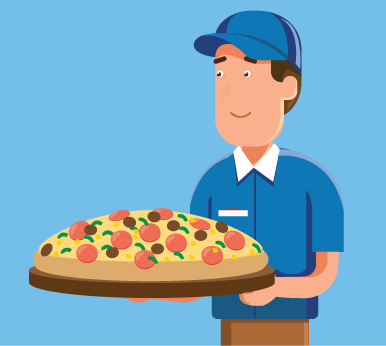,

This issue, we explore a unique feature of SpeedLine: the topping matrix. While you may never have heard of it, if you use SpeedLine Inventory™ software to reduce your food costs, many modifiers in your menu likely use a topping matrix. The matrix is created when a menu is made inventory-ready, and then automatically applies whenever a customer requests that modifier (topping, sauce, or dressing) be added to their "build your own" item during ordering. A topping matrix has two important functions:
- It allows topping usage to be accurately calculated for customizable menu offerings like pizzas, subs, and salads, when toppings or sauces that may not normally be part of the recipe are requested by the customer.
- It allows all SpeedLine users (and not just those with SpeedLine Inventory™) to print added toppings and their amounts on make tickets. This can really help with portion control and training new staff.
How the Topping Matrix Works
During setup, you or your menu builder can specify exactly how many ounces, slices, etc. of an added modifier should be used, based on the size of the pizza, and the total number of other toppings on it. A topping matrix is added to each modifier that can be used as a topping on create-your-own items. Create-your-own items have toppings added to them that aren't normally included in the item's recipe (Menu Designer records the recipe in item contents).
For example, the amount of pineapple to use for each size of Hawaiian pizza is specified in the recipe (item contents), so the pineapple topping matrix doesn't come into play when a Hawaiian is ordered. But if a customer decides to add pineapple to a small All-Meat pizza with 6 existing toppings, the topping matrix automatically determines how much pineapple to print on the make ticket, or remove from inventory, for this specific case.

The quantity of each topping depends on how many other toppings are applied, so create-your-own pizzas don't get soggy and difficult to bake because of over-topping.
Accurate Inventory
Without a topping matrix, it would be necessary to enter a recipe for every possible pizza and topping combination in the menu building software—an impossible task, as even in a smaller menu, the possible combinations quickly climb into the millions! That's why accurate inventory tracking is virtually impossible for a POS that's not specifically designed for pizza.
One modifier can have more than one topping matrix to specify amounts when it is added to different menu selections. For example, BBQ sauce could have one matrix for pizzas, another for wings, and a third for use with chicken tenders.
Printing Recipes on Make Tickets
To increase consistency, control portioning, and help out new kitchen staff, you can print recipes showing the amount of each ingredient on make tickets. When a topping matrix is set up, any toppings, sauces, or dressings added during ordering are also printed.
Try It Out: Print Recipes on Make Tickets
- In Menu Designer, add recipes (Item Contents nodes) to your menu items, if they do not already have them, and set them to print on the ticket. See To Print Recipes on Make Tickets in the Menu Designer help.
- Add a topping matrix to each modifier in your menu that can be added to a pizza, salad, etc. during customization, and ensure that "Print on Make Ticket" is set to "Always." See Add a Topping Matrix in the Menu Designer help.
- In Store Manager, set the print options to print item contents. See Print Recipes on Tickets in the Store Manager help.
Questions? Schedule a menu training session with SpeedLine Support. It's a benefit of your Support Services Subscription. Email: support@speedlinesolutions.com